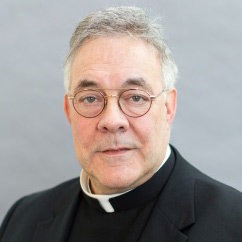Catholic World Report published a roundup of commentary on the fifth anniversary of Benedict’s pontificate. I contributed a piece titled Retrieval and Reintegration and was joined by a number of outstanding writers whose work is indexed here.
Benedict’s efforts to let the past inform and guide the Church’s future
By Father Robert Sirico
On March 18, 2005, having been at the Vatican to speak at a conference commemorating the 40th anniversary of Gaudium et Spes, I found myself concelebrating Mass in St. Peter’s Basilica with about 100 other priests. The principal celebrant was Cardinal Joseph Ratzinger. I was at the far end of the line of concelebrating priests and was surprised when, at the Offertory, the Master of Ceremonies approached me (I was conveniently at the end of the row) to assist at the ablution rites at the altar.
I had not realized until I sat down to write this reflection in honor of Pope Benedict’s election that the cardinal for whom I effectively served as an altar boy would be pope within a month. Providence is sometime a sobering thing.
The priest with whom I concelebrated Mass that day in such close proximity is indeed the same priest I see celebrate the Sacred Mysteries as successor to St. Peter. His focus and intense devotion are the same. It is almost as though depth and continuity are written into the man’s DNA.
By now the idea of a “hermeneutic of continuity” is beginning to permeate the Church universal. Gone, or at least soon gone, are the days when Catholics sing of “calling a new church into being” with straight faces. Likewise, talk of a “pre-conciliar” versus a post-Vatican II Church seems dated. Benedict has shown us how to retrieve what is authentically ours by Tradition, how not to fear that past, and how to permit the ancient liturgy to inform, guide, and deepen our worship today.
Yet, it is not only in the realm of ecclesiology or liturgy that this Benedictine effort toward reintegration is felt. One sees at as well in his effective and tireless effort in reaching out to the Eastern Churches (admittedly a dimension of ecclesiology) and in his development of the Church’s social teaching, evident in each of his encyclicals, but most especially in Caritas et Veritate. All of this effort at retrieval and reintegration comprises what might be called the leitmotif of his papacy.
In each of these areas and others as well, one sees a very careful mind at work to rediscover and welcome disparate truths, skillfully bringing the parts together to demonstrate a deeper, richer whole.
And yet, Providence can also sometimes be cruel, as it might appear now, when Benedict presides as pope in a moment of great difficulty and pain for the Church, owing largely to past negligence in the protection of the innocent and in the clarity of Catholic moral teaching.
Here, too, we affirm that the Church does not need to reinvent herself to address these grave matters; she does not need a new discipline for her priests or new standard of morality to propose to the faithful. The Church simply needs to embrace that same faith that Christ taught to the Apostles and to represent it anew to a society—and at this time a Church—that seems in some places to have forgotten it.

